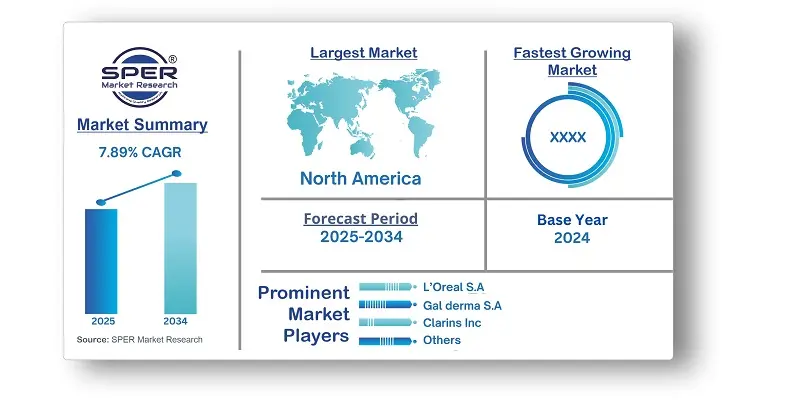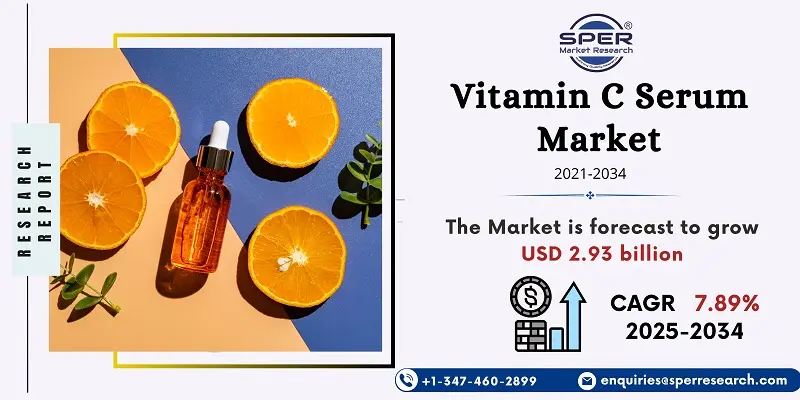
Vitamin C Serum Market Size, Growth Drivers, Trends, Analysis, Revenue and Future Outlook
Vitamin C Serum Market Size- By Concentration, By Type, By Distribution Channel- Regional Outlook, Competitive Strategies and Segment Forecast to 2034
| Published: Feb-2025 | Report ID: FMCG2528 | Pages: 1 - 251 | Formats*: |
| Category : Consumer & Retail | |||

- In July 2023: L’Oreal Group collaborated with Debut, a biotech beauty company, to develop over a dozen essential bio-identical ingredients that will replace conventional sources currently used in L’Oreal’ global beauty and personal care products, including hair, skin, color cosmetics, and fragrance. The program aims to transform ingredient procurement methods in the cosmetics industry by incorporating modern biotechnology processes such as fermentation and cell-free technologies.
- In February 2023: Shiseido Company, Limited’s subsidiary, Shiseido Americas Corporation, announced the completion of the acquisition of DDG Skincare Holdings LLC, the parent company of the Dr. Dennis Gross Skincare brand. This acquisition is part of Shiseido's strategic framework, which focuses on skin beauty and aims to strengthen its presence and growth in the Americas region while enhancing geographic diversification.

| Report Metric | Details |
| Market size available for years | 2021-2034 |
| Base year considered | 2024 |
| Forecast period | 2025-2034 |
| Segments covered | By Concentration, By Type, By Distribution Channel. |
| Regions covered | North America, Asia-Pacific, Latin America, Middle East & Africa and Europe. |
| Companies Covered | Amorepacific Group Inc., Beiersdorf AG, Clarins Inc., Estee Lauder Companies Inc., Gal derma S.A.,KOSE Corporation, L’Oreal S.A., Procter & Gamble Co., Shiseido Company Limited, Unilever plc., and Others. |
- Global Vitamin C Serum Market Size (FY’2021-FY’2034)
- Overview of Global Vitamin C Serum Market
- Segmentation of Global Vitamin C Serum Market By Concentration (Below 10%,10% to 20% and 20% and above)
- Segmentation of Global Vitamin C Serum Market By Type (Mass, Premium and Luxury)
- Segmentation of Global Vitamin C Serum Market By Distribution Channel (Hypermarkets & Supermarkets, Specialty Stores, Pharmacies & Drugstores, Online and Others)
- Statistical Snap of Global Vitamin C Serum Market
- Expansion Analysis of Global Vitamin C Serum Market
- Problems and Obstacles in Global Vitamin C Serum Market
- Competitive Landscape in the Global Vitamin C Serum Market
- Details on Current Investment in Global Vitamin C Serum Market
- Competitive Analysis of Global Vitamin C Serum Market
- Prominent Players in the Global Vitamin C Serum Market
- SWOT Analysis of Global Vitamin C Serum Market
- Global Vitamin C Serum Market Future Outlook and Projections (FY’2025-FY’2034)
- Recommendations from Analyst
1.1. Scope of the report1.2. Market segment analysis
2.1. Research data source
2.1.1. Secondary Data2.1.2. Primary Data2.1.3. SPERs internal database2.1.4. Premium insight from KOLs
2.2. Market size estimation
2.2.1. Top-down and Bottom-up approach
2.3. Data triangulation
4.1. Driver, Restraint, Opportunity and Challenges analysis
4.1.1. Drivers4.1.2. Restraints4.1.3. Opportunities4.1.4. Challenges
5.1. SWOT Analysis
5.1.1. Strengths5.1.2. Weaknesses5.1.3. Opportunities5.1.4. Threats
5.2. PESTEL Analysis
5.2.1. Political Landscape5.2.2. Economic Landscape5.2.3. Social Landscape5.2.4. Technological Landscape5.2.5. Environmental Landscape5.2.6. Legal Landscape
5.3. PORTERs Five Forces
5.3.1. Bargaining power of suppliers5.3.2. Bargaining power of buyers5.3.3. Threat of Substitute5.3.4. Threat of new entrant5.3.5. Competitive rivalry
5.4. Heat Map Analysis
6.1. Global Vitamin C Serum Market Manufacturing Base Distribution, Sales Area, Product Type6.2. Mergers & Acquisitions, Partnerships, Product Launch, and Collaboration in Global Vitamin C Serum Market
7.1. Below 10%7.2. 10% to 20%7.3. 20% and Above
8.1. Mass8.2. Premium8.3. Luxury
9.1. Hypermarkets & Supermarkets9.2. Specialty Stores9.3. Pharmacies & Drugstores9.4. Online9.5. Others
10.1. Global Vitamin C Serum Market Size and Market Share
11.1. Asia-Pacific
11.1.1. Australia11.1.2. China11.1.3. India11.1.4. Japan11.1.5. South Korea11.1.6. Rest of Asia-Pacific
11.2. Europe
11.2.1. France11.2.2. Germany11.2.3. Italy11.2.4. Spain11.2.5. United Kingdom11.2.6. Rest of Europe
11.3. Middle East and Africa
11.3.1. Kingdom of Saudi Arabia11.3.2. United Arab Emirates11.3.3. Qatar11.3.4. South Africa11.3.5. Egypt11.3.6. Morocco11.3.7. Nigeria11.3.8. Rest of Middle-East and Africa
11.4. North America
11.4.1. Canada11.4.2. Mexico11.4.3. United States
11.5. Latin America
11.5.1. Argentina11.5.2. Brazil11.5.3. Rest of Latin America
12.1. Amorepacific Group Inc.
12.1.1. Company details12.1.2. Financial outlook12.1.3. Product summary12.1.4. Recent developments
12.2. Beiersdorf AG
12.2.1. Company details12.2.2. Financial outlook12.2.3. Product summary12.2.4. Recent developments
12.3. Clarins Inc.
12.3.1. Company details12.3.2. Financial outlook12.3.3. Product summary
12.3.4. Recent developments
12.4. Estee Lauder Companies Inc.
12.4.1. Company details12.4.2. Financial outlook12.4.3. Product summary12.4.4. Recent developments
12.5. Gal derma S.A.
12.5.1. Company details12.5.2. Financial outlook12.5.3. Product summary12.5.4. Recent developments
12.6. KOSE Corporation
12.6.1. Company details12.6.2. Financial outlook12.6.3. Product summary12.6.4. Recent developments
12.7. LOreal S.A.
12.7.1. Company details12.7.2. Financial outlook12.7.3. Product summary12.7.4. Recent developments
12.8. Procter & Gamble Co.
12.8.1. Company details12.8.2. Financial outlook12.8.3. Product summary12.8.4. Recent developments
12.9. Shiseido Company Limited
12.9.1. Company details12.9.2. Financial outlook12.9.3. Product summary12.9.4. Recent developments
12.10. Unilever plc
12.10.1. Company details12.10.2. Financial outlook12.10.3. Product summary12.10.4. Recent developments
SPER Market Research’s methodology uses great emphasis on primary research to ensure that the market intelligence insights are up to date, reliable and accurate. Primary interviews are done with players involved in each phase of a supply chain to analyze the market forecasting. The secondary research method is used to help you fully understand how the future markets and the spending patterns look likes.
The report is based on in-depth qualitative and quantitative analysis of the Product Market. The quantitative analysis involves the application of various projection and sampling techniques. The qualitative analysis involves primary interviews, surveys, and vendor briefings. The data gathered as a result of these processes are validated through experts opinion. Our research methodology entails an ideal mixture of primary and secondary initiatives.



Frequently Asked Questions About This Report
PLACE AN ORDER
Year End Discount
Sample Report
Pre-Purchase Inquiry
NEED CUSTOMIZATION?
Request CustomizationCALL OR EMAIL US
100% Secure Payment






Related Reports
Our Global Clients
Our data-driven insights have influenced the strategy of 200+ reputed companies across the globe.




















